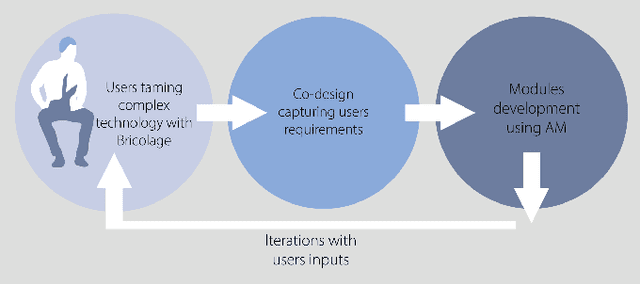Alexandre Colle
Co-Design of Assistive Robotics with Additive Manufacturing and Cyber-Physical Modularity to Improve Trust
Aug 02, 2021
Abstract:Robotics and automation have the potential to significantly improve quality of life for people with assistive needs and their carers. Adoption of such technologies at this point in time is far from widespread. This paper presents a novel approach to the design of highly customisable robotic concepts, embracing modularity and a co-design process to increase the involvement of end-users in the development life cycle. We discuss this process within the context of an elderly care use case. Using design methodology and additive manufacturing, we outline how key stakeholders can be involved from initial conception through to integration of the final product within their environments. In future work, we will apply this process to demonstrate the effectiveness of our approach for improving long-term acceptance and trust of robotic technology in care contexts.
Test Framework for a Virtual Competition Testbed
Jul 01, 2021
Abstract:Virtual environments have been utilised in robotics research as a tool to assess systems before deploying them in the field. The COVID-19 pandemic has brought about additional motivation for the development of virtual benchmarks in order to aid in safe and productive development. In-person robotics competitions have also halted, thus limiting the scope of opportunities for students and researchers. We implemented the structure of a service robotics competition into an extendable and adaptable virtual scoring environment. The competition challenges the state of the art in home service robotics by presenting realistic household tasks for robots to complete. The virtual environment provides a foundation for competition teams to assess their systems when accessing the physical environment is not possible. We believe that utilising virtual environments as a means of assessment will lead to other benefits such as increased access and generalisation.
 Add to Chrome
Add to Chrome Add to Firefox
Add to Firefox Add to Edge
Add to Edge